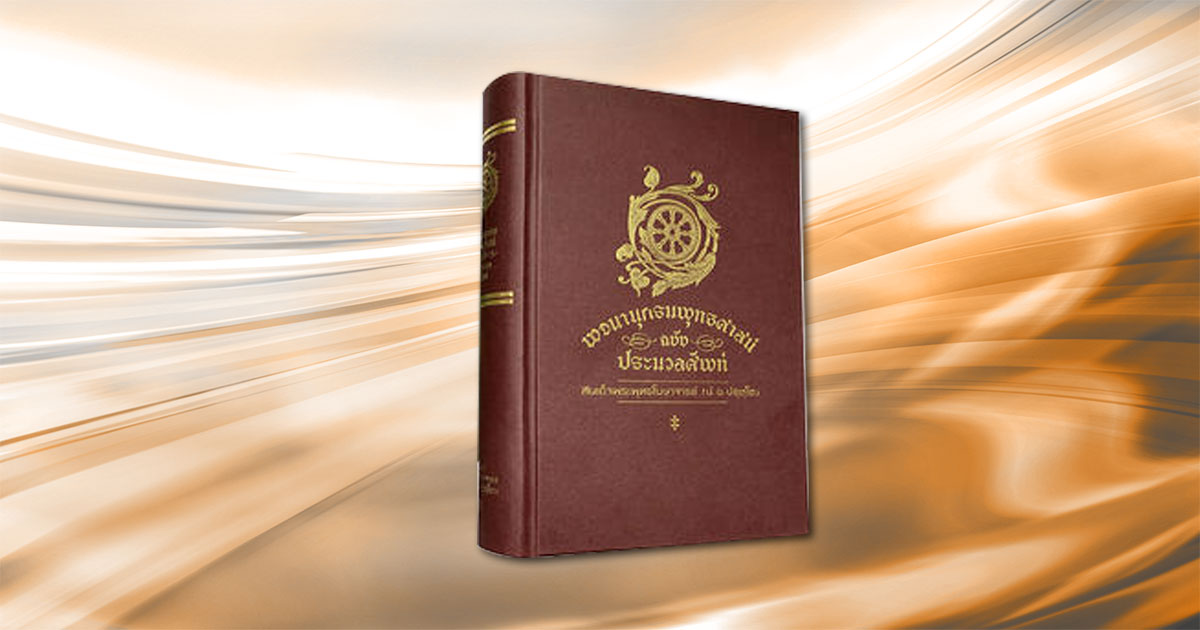

|
จงกรม |
walking up and down; a terraced walk. v. to walk up and down. |
|
จตุตถฌาณ |
the fourth Jhana; the fourth absorption. |
|
จตุธาตุววัตถาน |
analysis of the four elements; determining of the elements; contemplation on the 4 essential qualities of which the body is composed. |
|
จตุปัจจัย |
ดู ปัจจัย |
|
จตุรพิธพร |
the fourfold blessing; the four excellent things, viz., long life, beauty, happiness and health. |
|
จตุราริยสัจจ์ |
the Four Noble Truths; the Four Holy Truths. |
|
จตุวรรค |
a chapter of four monks. |
|
จรณะ |
behavior; conduct; good conduct. |
|
จริต |
the intrinsic nature of a person; (the six types of) characteristic behavior; character; temperament. |
|
จริยาปิฎก |
“Modes of Conduct”; name of the fifteenth division of the Kuddaka Nikaya. |
|
จริยาวัตร |
1. customs and manners to be observed; duties concerned with conduct. 2. conduct and duties; moral conduct and the performance of duties. |
|
จักขุ, จักษุ |
the eye. |
|
จักขุทวาร |
the eye-door; eye-avenue. |
|
จักขุวิญญาณ |
eye-consciousness. |
|
จักร, จักรธรรม |
the set of four virtues, being like the four wheels of a carriage, constituting the means to prosperity; virtues wheeling of prosperity. |
|
จักรพรรดิ |
1. world-king; a universal monarch, endowed with the seven valuables or treasures. 2. (T.) an emperor. |
|
จักรวาล |
a world-circle; solar system. |
|
จัณฑาล |
an outcaste; the untouchable. |
|
จันทรคติ |
the system of a lunar calendar. |
|
จาคะ |
1. charity; generosity; sacrifice; self-denial; liberality; munificence; benefaction. 2. abandoning; giving up; renunciation. |
|
จาคสัมปทา |
achievement of charity. |
|
จาคานุสติ |
reflection on generosity; recollection of liberality. |
|
จาตุทสี |
the 14th day of a fortnight. |
|
จาตุมหาราช |
the Four Guardian Deities; the realm of the Four Great Kings. |
|
จาตุรงคสันนิบาต |
the Great Assembly of Disciples marked by the union of four factors. |
|
จาริก |
1. a traveler; wanderer; way-farer. 2. a wandering pave. 3. a journey; wandering. 4. (T.) v. to wander; go on a journey. |
|
จารึก |
v. to inscribe; incise; engrave. |
|
จำพรรษา, การ |
Vassa-residence; the rains-retreat; rains-residence; keeping the Buddhist Lent; keeping the rainy season; dwelling permanently at a suitable place throughout the three months of the rainy season. |
|
จำวัด |
v. to sleep (of a monk or novice). |
|
จิต, จิตต์ |
thought; mind; a state of consciousness. |
|
จิตกาธาน |
a funeral pile; crematorium; pyre; crematory; catafalque. |
|
จิตตะ |
thought; thoughtfulness; active thought. |
|
จิตตนิยาม |
psychic order; psychic law; order of mind. |
|
จิตตวิสุทธิ |
purity of mind; purification of consciousness. |
|
จิตตสังขาร |
mental formation; mental function, i.e., perception and feeling. |
|
จิตตานุปัสสนา |
the contemplation of mind; contemplation of various states of mind; mindfulness as regards thoughts. |
|
จิตตุบาท, จิตตุปปาท |
the rise of a thought; thought; intention. |
|
จินตมยปัญญา |
understanding through reasoning; wisdom resulting from reflection. |
|
จีวร |
1. the yellow robe (of a Buddhist monk or novice); any of the three garments of the monk. 2. (T.) the upper inner robe. |
|
จีวรอธิษฐาน |
the determined robes; the three robes determined for regular personal use. |
|
จีวรอาศัย |
an extra robe. |
|
จุติ |
shifting (out of one existence to another); decease; the final thought-moment of particular life; death. |
|
จุติจิต |
death-consciousness; dying or death-consciousness; the consciousness disconnecting the present life. |
|
จุติวิญญาณ |
ดู จุติจิต |
|
จุตูปปาตญาณ |
the knowledge of the decease and rebirth of beings; the clairvoyant supernormal vision dealing with the death and rebirth of beings; the perception of the appearing and disappearing of various beings according to the consequences of their past deeds. |
|
จุลลวรรค |
“Smaller Section”; name of a book of the Vinaya Pitaka. |
|
เจดีย์ |
1. a person, place or object worthy of worship; reminder. 2. (T.) a sepulchral monument; pagoda; shrine; dagoba; bell-shaped stupa (with a slender spire); tapering-spired stupa; Phra Chedi. |
|
เจตนา |
volition; will; intention. |
|
เจตภูต |
soul; the self; Atman. |
|
เจตสิก |
mental concomitants; mental factors; mental states; mental activities; the adjuncts of consciousness; mental adjuncts; mental coefficients. |
|
เจตสิกทุกข์ |
mental pain. |
|
เจตสิกสุข |
mental happiness. |
|
เจโตปริยญาณ |
knowledge of others’ thoughts; telepathy. |
|
เจโตวิมุตติ |
deliverance of mind. |
|
เจริญพระพุทธมนต์ |
to chant holy stanzas. |
|
เจ้าคณะ |
1. Chief monk of an administrative division; eccl. Chief officer; eccl. Governor. 2. Chief monk of a monastery-section. |
|
เจ้าคณะจังหวัด |
the Ecclesiastical Provincial Governor. |
|
เจ้าคณะตำบล |
the Ecclesiastical Commune-Chief. Eccl. Dub-District Head. |
|
เจ้าคณะภาค |
the Ecclesiastical Regional Governor. |
|
เจ้าคณะใหญ่ |
the Chief Superintendent of the (Central, North, South, East, or Dhammayutika) Ecclesiastries; Chief of the … Eccl. Jurisdiction; Eccl. Governor General. |
|
เจ้าคณะอำเภอ |
the Ecclesiastical District Officer. |
|
เจ้าคุณ |
a title unofficially used in speaking to or of a monk of a higher rank; “Chao Khun”; “The Right Venerable”. ดู พระราชาคณะ |
|
เจ้าภาพ |
the host; sponsor; chief donor. |
|
เจ้าอธิการ |
the abbot who is an Ecclesiastical Village-Chief as well. |
|
เจ้าอาวาส |
the abbot. |
|
เจิม |
v. to anoint. n. anointment. |
|
แจกัน |
a vase. |
|
แจง |
preaching or chanting on the account of the First Council of Buddhism. |
|
โจทก์ |
reprover; accuser; plaintiff. |
|
โจทนา |
reproof; charge; accusation; plaint. |